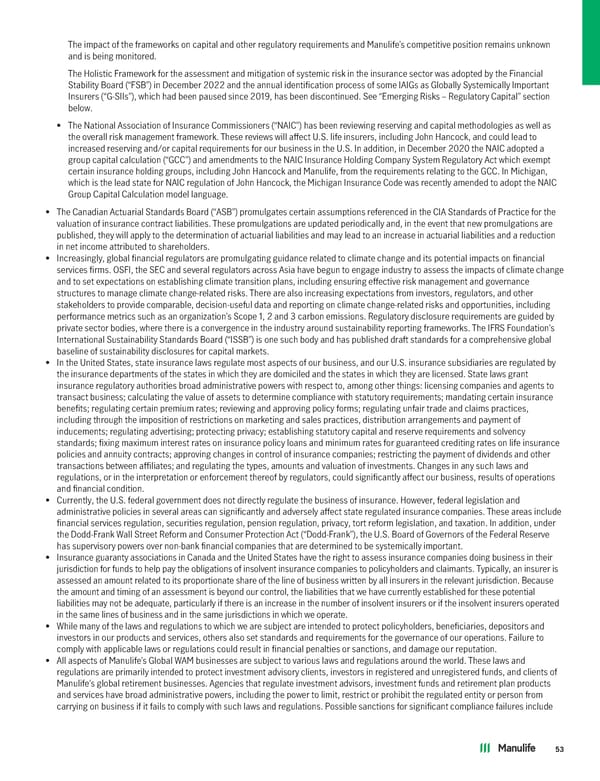The impact of the frameworks on capital and other regulatory requirements and Manulife’s competitive position remains unknown and is being monitored. The Holistic Framework for the assessment and mitigation of systemic risk in the insurance sector was adopted by the Financial Stability Board (“FSB”) in December 2022 and the annual identification process of some IAIGs as Globally Systemically Important Insurers (“G-SIIs”), which had been paused since 2019, has been discontinued. See “Emerging Risks – Regulatory Capital” section below. • The National Association of Insurance Commissioners (“NAIC”) has been reviewing reserving and capital methodologies as well as the overall risk management framework. These reviews will affect U.S. life insurers, including John Hancock, and could lead to increased reserving and/or capital requirements for our business in the U.S. In addition, in December 2020 the NAIC adopted a group capital calculation (“GCC”) and amendments to the NAIC Insurance Holding Company System Regulatory Act which exempt certain insurance holding groups, including John Hancock and Manulife, from the requirements relating to the GCC. In Michigan, which is the lead state for NAIC regulation of John Hancock, the Michigan Insurance Code was recently amended to adopt the NAIC Group Capital Calculation model language. • The Canadian Actuarial Standards Board (“ASB”) promulgates certain assumptions referenced in the CIA Standards of Practice for the valuation of insurance contract liabilities. These promulgations are updated periodically and, in the event that new promulgations are published, they will apply to the determination of actuarial liabilities and may lead to an increase in actuarial liabilities and a reduction in net income attributed to shareholders. • Increasingly, global financial regulators are promulgating guidance related to climate change and its potential impacts on financial services firms. OSFI, the SEC and several regulators across Asia have begun to engage industry to assess the impacts of climate change and to set expectations on establishing climate transition plans, including ensuring effective risk management and governance structures to manage climate change-related risks. There are also increasing expectations from investors, regulators, and other stakeholders to provide comparable, decision-useful data and reporting on climate change-related risks and opportunities, including performance metrics such as an organization’s Scope 1, 2 and 3 carbon emissions. Regulatory disclosure requirements are guided by private sector bodies, where there is a convergence in the industry around sustainability reporting frameworks. The IFRS Foundation’s International Sustainability Standards Board (“ISSB”) is one such body and has published draft standards for a comprehensive global baseline of sustainability disclosures for capital markets. • In the United States, state insurance laws regulate most aspects of our business, and our U.S. insurance subsidiaries are regulated by the insurance departments of the states in which they are domiciled and the states in which they are licensed. State laws grant insurance regulatory authorities broad administrative powers with respect to, among other things: licensing companies and agents to transact business; calculating the value of assets to determine compliance with statutory requirements; mandating certain insurance benefits; regulating certain premium rates; reviewing and approving policy forms; regulating unfair trade and claims practices, including through the imposition of restrictions on marketing and sales practices, distribution arrangements and payment of inducements; regulating advertising; protecting privacy; establishing statutory capital and reserve requirements and solvency standards; fixing maximum interest rates on insurance policy loans and minimum rates for guaranteed crediting rates on life insurance policies and annuity contracts; approving changes in control of insurance companies; restricting the payment of dividends and other transactions between affiliates; and regulating the types, amounts and valuation of investments. Changes in any such laws and regulations, or in the interpretation or enforcement thereof by regulators, could significantly affect our business, results of operations and financial condition. • Currently, the U.S. federal government does not directly regulate the business of insurance. However, federal legislation and administrative policies in several areas can significantly and adversely affect state regulated insurance companies. These areas include financial services regulation, securities regulation, pension regulation, privacy, tort reform legislation, and taxation. In addition, under the Dodd-Frank Wall Street Reform and Consumer Protection Act (“Dodd-Frank”), the U.S. Board of Governors of the Federal Reserve has supervisory powers over non-bank financial companies that are determined to be systemically important. • Insurance guaranty associations in Canada and the United States have the right to assess insurance companies doing business in their jurisdiction for funds to help pay the obligations of insolvent insurance companies to policyholders and claimants. Typically, an insurer is assessed an amount related to its proportionate share of the line of business written by all insurers in the relevant jurisdiction. Because the amount and timing of an assessment is beyond our control, the liabilities that we have currently established for these potential liabilities may not be adequate, particularly if there is an increase in the number of insolvent insurers or if the insolvent insurers operated in the same lines of business and in the same jurisdictions in which we operate. • While many of the laws and regulations to which we are subject are intended to protect policyholders, beneficiaries, depositors and investors in our products and services, others also set standards and requirements for the governance of our operations. Failure to comply with applicable laws or regulations could result in financial penalties or sanctions, and damage our reputation. • All aspects of Manulife’s Global WAM businesses are subject to various laws and regulations around the world. These laws and regulations are primarily intended to protect investment advisory clients, investors in registered and unregistered funds, and clients of Manulife’s global retirement businesses. Agencies that regulate investment advisors, investment funds and retirement plan products and services have broad administrative powers, including the power to limit, restrict or prohibit the regulated entity or person from carrying on business if it fails to comply with such laws and regulations. Possible sanctions for significant compliance failures include 53
 2022 Annual Report Page 54 Page 56
2022 Annual Report Page 54 Page 56